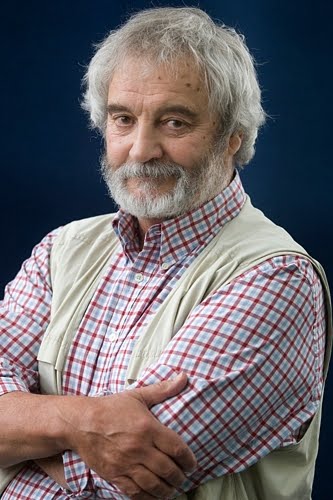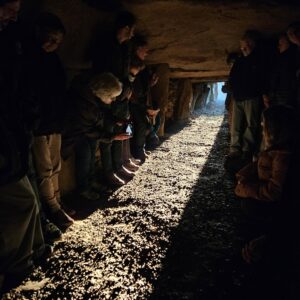
It’s too early to tell,. But we ought to give it our best shot, according to our guest columnist, Colin Tudge
On a recent Farming Today This Week on Radio 4 a Shropshire farmer who among other things grows wheat, declared that organic farming is “never going to feed the world”. And this view is clearly shared by many other farmers of the kind who these days are called “conventional”, and by the powers-that-be, the people who have most influence in the world and especially in agriculture.
But is this true? If it is not, does this mean that almost the whole of the agrochemical and biotech industries that now are pillars of the world’s economies are surplus to requirements? And since the industrial farming that relies on them so heavily is so massively polluting and contributes significantly to global warming, does that mean that we should wean ourselves off it, just as the world is at least half-heartedly seeking to wean itself away from fossil fuels? Clearly, there’s a very great deal at stake.
By way of preliminary:
What exactly is “organic”?
As I see things, the term “organic” in an informal, vernacular sense applies to all those farmers and growers in the history of the world and in the present day who either through necessity or choice make zero use of industrial chemistry: artificial fertilizers, herbicides, and pesticides. So it includes all those who farmed before the mid-19th century, when John Bennet Lawes in England and Justus von Liebig in Germany first drew attention to the specific importance of N and P in fertilizers and so introduced recognizably modern chemistry into farming, and to all the many millions of farmers in the present day, especially in Africa and Asia, who still farm by traditional, indigenous methods. So in the long history of agriculture and probably too in the present day most farmers have been, or are, organic in the informal sense.
Organic in the formal sense refers specifically to those farmers and growers who follow strict rules laid down by a recognized authority such as Britain’s Soil Association and then if they pass muster are duly certified. Formally certified organic farmers and growers are very much in the minority.
A lawyer might say that farmers who are organic in the informal sense are organic de facto and those who are certified are organic de jure. A taxonomist might say that an informally defined organic farmer is organic sensu lato (s.l.) while the certified kind are organic sensu stricto (s.s). As far as I know nobody does use these terms in this context but they could be useful and one or other of them could catch on and I just thought I’d mention it.
Clearly, all organic farmers who are organic de jure are also organic de facto. But only a minority of those who are organic de facto are organic de jure.
In practice: Agroecology properly conceived is always de facto organic (but not necessarily de jure); those who practice Regenerative Agriculture are sometimes organic but by no means always since many are wont to clear their fields with glyphosate; Permaculturalists seem commonly to be organic (at least de facto) though not necessarily; Biodynamic farmers must be organic; and those who subscribe to Pasture for Life are sometimes organic and sometimes not. The picture is somewhat complicated, in short.
But the question remains:
Can organic farming – de facto – “feed the world” or can’t it?
Or to put the matter another way:
“Can we hope to ensure that everyone with the world now and in the future has access to abundant food of the highest quality without recourse to industrial agro-chemicals – or at least with only minimal recourse? Is that even possible? And even if it is possible, would such a course be optimal?”
Well, frankly, I don’t know the answers — and in the present state of knowledge, neither does anyone else. But a great many farmers in the modern world assume that it cannot. And so too does the virtual oligarchy who call the shots – which in practice is a loose and fractious consortium of governments like ours, the corporates, various brands of financiers, and their chosen expert and influential advisers from academe and in various supposedly independent but nonetheless officially approved think-tanks, who for the most part tell the oligarchs what they want to hear.
So, say the panjandrums, although large-scale industrial farming may lack aesthetic appeal (as least in many people’s eyes) it is necessary. De rigueur. We cannot hope to feed the present and future population adequately without industrial agrochemistry – its use limited only by cost-effectiveness. In any case, high tech and big business represent progress and progress is what we should be striving for. The rest of us should keep our heads down and have faith in our leaders.
So although organic farming and growing (whether formally or informally defined) is OK as far as it goes it can never be more than niche – acceptable in rich countries for social and economic reasons, but not for the serious purpose of nourishing humankind. The poorer countries are forced to make do with organic farming (de facto) for the time being, but only because they can’t afford agrochemistry or biotech. But in the fullness of time, thanks to the ingenuity of companies like Bayer and through the vision of philanthropists like Bill Gates, and through foreign aid with suitable strings attached, they too must go down the high-tech, industrial route. The only real obstacle is the widely though not universally accepted need to replace fossil fuels with renewables (which, so the powers-that-be seem to agree, must be done cautiously, meaning slowly, so as not to upset the economic status quo). That and the obduracy of indigenous farmers, and the more or less continuous wars that are a permanent feature of many of the world’s most needful countries, and of course climate change, which threatens to make nonsense of everybody’s schemes.
But in truth – and this should be bruited loud and oft — nobody knows what would be for the best (and of course there’s wide disagreement on what the “best” would look like). By now, though, it surely is beyond reasonable doubt that from an ecological point of view that organic farming whether in the formal or informal sense – with minimum and preferably zero input of artificial fertilizers and the rest — is the right way to go. And what’s right ecologically is also likely to be right morally, spiritually, and socially.
Of course in the present state of knowledge it surely would be foolish to ban all high-tech chemistry and pharmacy from the world’s farms across the board and for all times – but then no-one that I know is suggesting that we should. It surely would be precipitate to impose any such ban overnight – but that would not even be possible even if anyone wanted to, so it’s not on the agenda. Yet it surely would be sensible to make organic farming (informally conceived) our default position: always to farm organically unless there is a very good reason to do otherwise. It surely is sensible to encourage farmers to farm organically, both by persuasion and with moral and economic support. And it surely would be sensible and good to invest at least as much effort and wealth into organic research as we now sink into the highly speculative, commercial-industrial kind.
Indeed it surely would be sensible even with the present state of knowledge to seek to follow the organic route with all possible energy and to see how far we get. It may prove possible after all to feed everybody well entirely by organic farming, with the reasonable hope that this would help to create agreeable ways of life, and keep our fellow creatures in good heart. Even if we find that we really do need some industrial farming, we surely need a far better balance of industrial versus organic than we have now. Indeed, the search for such a balance so as to farm in the most people and wildlife friendly and effective way possible should, I suggest, be seen as the principal practical task for all humankind. It is the most worthwhile thing to do, and should be the focus of all our endeavours.
We should, in short, give organic farming our best shot, and only if and when it falls short should we reach for the fertilizer and the pesticides and herbicides (and fungicides and all the other -cides), and invoke the ultra-high technologies of genetic engineering, including gene editing, which in practice if not in theory must be developed and dispensed by governments and corporates and thus are at odds with the fundamental principle of Food Sovereignty. The industrial kind of farming that now is seen in high places to represent progress should be held in reserve for emergencies, in the way that the Swiss keep snow-ploughs on stand-by.
If it should be argued, as indeed it is already, that all-out organic farming is impossible because it is uneconomic – “unrealistic” is the favoured expression of those in positions of influence who seek to maintain the status quo – then we should ask ourselves what really matters in life, and whether it is sensible to put such store by the dictats of the crude and ad hoc dogmas of economics. Indeed we need to reverse was has become the standard thought process: not to ask how we can adjust our lives to fit the economic doctrine of the day, but how we can create an economy that enables us to do what seems morally right and is ecologically sensible. It is at least absurd to bring humanity and most of our fellow creatures to a shuddering halt just because we’re afraid to question existing ideologies and economic norms. More broadly, as J M Keynes no less declared and many others have echoed since, it is absurd to regard economic treatises as sacred texts, whether written in some past age or fresh-minted in some think tank, and it is seriously misguided to treat economists as prophets. No-one should be granted such status (except perhaps a few bona fide prophets).
All in all, I suggest, for the people in positions of influence to write off organic farming a priori is too cavalier by half. It is far too important to dismiss out of hand – especially when the people doing the dismissing are by no means expert, and ignore the arguments of people who are. (The folly of such high-handedness is all too evident from the covid inquiry, which is in progress even as I write).
Of course the questions all this raises are endless. Is it really better to farm organically, and to what extent, and why? What’s the best way to go about it? What are the pros and cons? What new infrastructures would we need if organic farming really did become the national and the global norm? And how might we make the necessary shift most fruitfully and painlessly? Such discussion should indeed be endless as discussion is and always has been in all serious matters from physics to theology.
Indeed – one cause for hope — many of the necessary discussions are already taking place, and many farmers both new and established are already making the necessary changes. But the discussion is patchy. It receives no concerted support or any at all from governments such as ours and their corporate, financial, and academic allies and dependents. And yet, I suggest, agriculture is by far the most important thing that human beings do, even if governments like ours don’t take it seriously, and tend to see it as an encumbrance, out of synch with the modern, frenetic, fixation on high tech and the “free” market economy. And this single question with all its ramifications – should we strive to farm organically or continue to pursue the neoliberal-industrial approach? – is perhaps the most important question of a practical, material kind that we should be asking; if, that is, we really care about the fate of humanity and the natural world. So if, for example, we are going to maintain an international outfit like FAO, this is the question that ought to be at the heart of their concerns.
So in the spirit of democracy – everyone who wants to stick their oar in should have their say – here are a few points that seem pertinent:
A few pertinent notions
1: It surely isn’t true as technophilic politicians and commercial entrepreneurs would have us believe that the world’s various food crises (famines and malnutrition in general) result primarily or at all from our inability to grow enough food. As Hans Herren has pointed out many a time and oft, he the President and CEO of the Millennium Institute in Washington, the world already produces twice as much protein and food energy as humanity really needs so the continuing accent on production and productivity is absurd (just as the continued obsession with economic “growth” in general is absurd).
Professor Herren’s claim can be ratified with a back-of-the envelope calculation. Thus, the world currently produces around 2.5 billion tonnes of cereal per year, and since one tonne of cereal supplies enough calories – and protein! – to feed three people for a year, or at least three healthy adults, that’s enough to meet the basic needs of 7.5 billion people. But although cereals are by far the most important crops worldwide they provide only half the world’s total intake of calories and protein. The other half – and most of the essential fats and micronutrients – is supplied by non-cereal grains and pulses and nuts and fruits and tubers and livestock and fish and all the rest. So the number that could be well nourished by the food we already produce is around 7.5 x 2= 15 billion. That’s not far short of twice the current population. So we have more leeway than we might suppose.
In similar vein, the Indian economist Amartya Sen pointed out in the 1980s that famines never occur in modern democracies. Always they result from inappropriate economics and from grand but unsuitable political ideologies imposed from the top, whether by Stalin in early 20th century Russia or by modern neoliberals. But such observations are inconvenient and (as again is demonstrated by the on-going covid inquiry, and by Rishi’s enthusiasm for North Sea oil, and the Saudis’ stated ambition to sell as much oil as they can extract) whatever is inconvenient is liable to be ignored.
So as always, before we summon up the genies of high tech, we should explore and correct the flaws in the economy and in the mindset of governments that control the economy, or at least have power over it.
2: We need as a sine qua non to match what we eat, and want to eat, to the realities of agroecological farming. In particular it is gross, profligate, and hugely destructive to do as we do now, and feed half the world’s cereal crop to livestock, and well over 90 per cent of the soya, and to grow it all expressly for that purpose, and to build our whole cuisine and diet around meat.
Livestock of course has various important roles to play in agroecological farming, especially in large tracts of Africa which are too dry for crops to grow reliably, and cattle and goats to a lesser extent are deeply embedded in the culture. In the whole world, too, animal protein and fats and micronutrients are significant players in the human diet. So we don’t need to be vegan but we do need to raise animals only in humane and ecologically sensible ways which means we’d produce far less than now. Yet there should be no hardship in this since, as discussed elsewhere on this website, there is an almost perfect one-to-one match between agroecological farming, sound nutrition, and the world’s greatest traditional cuisines on a broad axis from Italy to China, all of which use meat sparingly and to its best effect. Farming is the most important thing that human beings do but cooking is first equal. So we do need to re-learn how to cook in ways that are ecologically sound and gastronomically pleasing (not least as recommended on this website by Suzanne Wynn).
Liz Truss’s proud boast a few years back that she had sold more (intensively raised) pork to China shows just how far our government and the global economy in general have strayed from reality. She of course is out with the fairies but so it seems in matters like this are most people in the highest places. Neither of course do we need to put our faith in ersatz meat brewed from bacteria, as recommended by George Monbiot and other technophiles. And as Nick Saltmarsh and Josiah Meldrum of Hodmedods argue on this website it makes no sense at all to turn beans into ersatz. The world’s greatest cookbooks from all countries burst with recipes for pulses in their pristine state.
3: Organic arable as so far practiced is not as productive as the industrial kind – but then, as noted above, right now we produce almost twice as much food as is really necessary, and at least half of the world’s cereal (and 90 per cent of the soya) is fed to intensively kept livestock. As noted elsewhere on this website, we could raise all the livestock that’s really needed by traditional means – ruminants and other committed herbivores on pasture, including browse, with the omnivorous pigs and poultry fed primarily on surpluses and leftovers. So maybe the shortfall in arable yield should not matter too much. And many studies have shown that yields from organic horticulture can be very high indeed – and we surely should make more use of horticulture than we now do. It must be the case, too, that the potential overall is far greater than we have seen so far.
4: Agroecological farming done well is more labour intensive than the high-tech commercial kind, which after all is expressly designed to reduce labour, so as to cut costs. In an ageing population like ours that looks like a problem (not enough young people to do the graft) but in a less frenetic and altogether saner world this should be seen as an advantage. For them as love it, of whom there are many, farming and growing are among the most fulfilling of careers, alongside medicine, teaching, and playing the French horn in the LSO or second-row for the Harlequins. Those who shudder at the thought of such pursuits need not and should not apply. As AI and robots encroach more and more on our lives fulfilment is at a premium.
5: Finally, it is worth stating the obvious: that we cannot continue much longer with super-intensive high-input agriculture because we are exhausting and eroding much of the world’s most fertile soils at an alarming rate. A switch to more organic methods, especially in the form of agroecology, is surely necessary.
It seems, though, to end for the time being on a high note, that even at this late and desperate hour we should have far more leeway than those in high places choose to believe. Indeed, if only we did conceptually simple things well we could surely pull through the present crises and emerge far stronger on the other side. And the conceptually simple things we need to do include organic farming sensu lato. At least we should give it a much fairer crack of the whip. To write it off as a middle-class indulgence is cavalier in the extreme. Indeed for governments like ours and the other oligarchs to do so seems borderline wicked.
ADDENDUM: A NOTE ON VETERINARY MEDICINE
One complication: animals and crops as well as humans from time to time need medicines and although traditional measures including herbal medicine still play a huge role in curing and preventing the world’s ills, most people the world over acknowledge the additional benefits of at least some modern salves, unguents, balms, drugs, analgesics, anaesthetics, antibiotics, and vaccines. So it is that poor farmers who cannot afford not to be organic in the informal sense may nonetheless benefit from government-sponsored programmes of vaccination, and the various bodies that certify modern organic farmers do allow some modern pharmaceuticals to be used in some contexts provided appropriate rules are followed. We should always be guided by common sense and the bedrock moral principle of compassion and it seems both sensible and compassionate for example to vaccinate against infections that can cause pandemic yet can be prevented. I mention this in passing in case someone says, “Ah, but what about pharmaceuticals?” Of course modern medicines are high-tech but it’s perverse to be anti-high tech in principle. We just need always to ask, as E F Schumacher did, what is necessary and what is appropriate.
See further: www.colintudge.com




